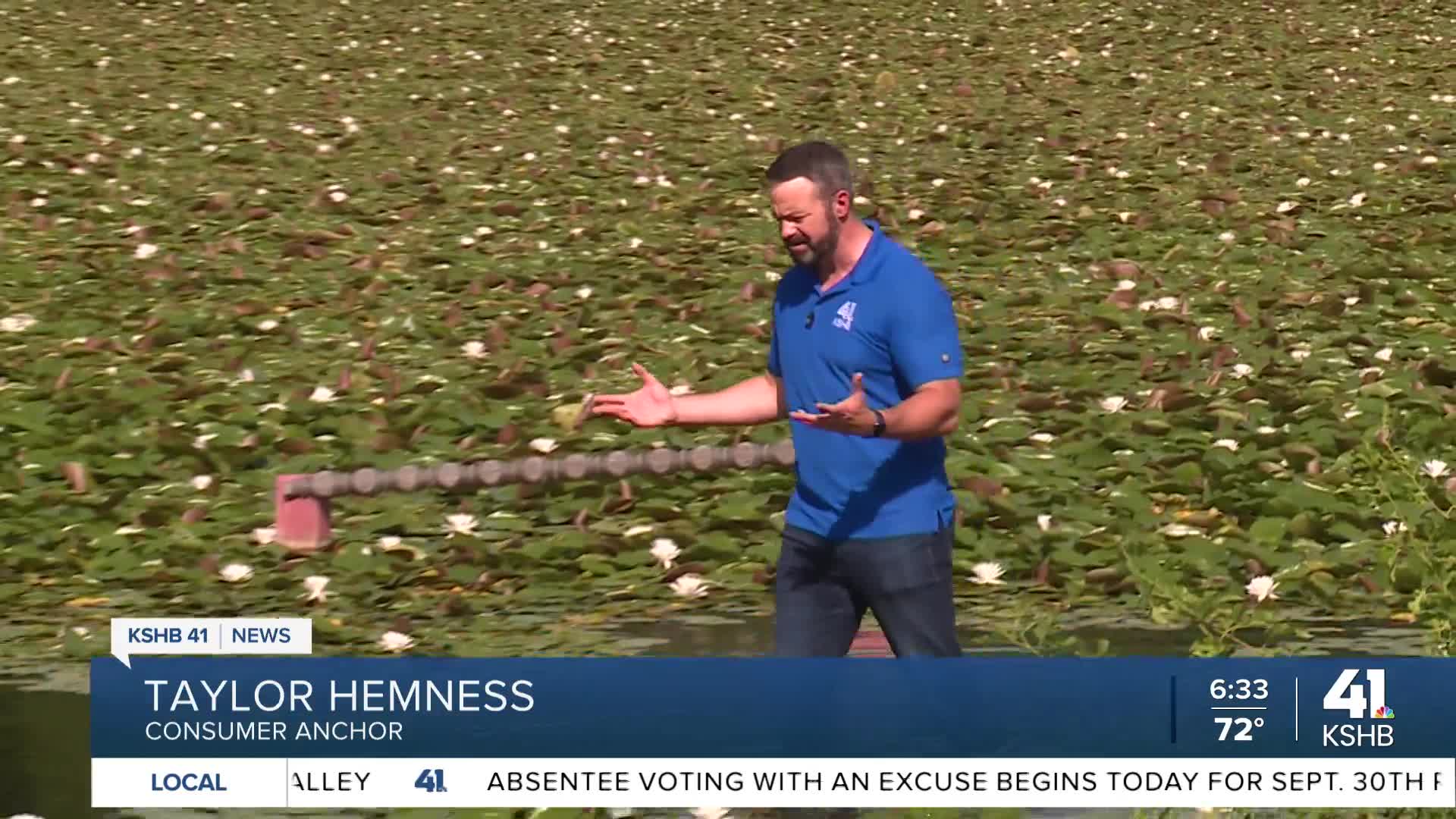TARSNEY LAKES, Mo. — In early August, at our Let's Talk event in Grain Valley, a viewer came up to me and said, "Tarsney Lake has a lily pad problem."
"What kind of lily pad problem?" I asked.
Tarsney Lakes is an unincorporated community just outside Grain Valley with two small lakes, Tarsney Lake and Wood Lake. Sections of Tarsney Lake — a small, public lake — are overrun with lily pads.
The people who live near the lake told me they've been asking Jackson County to help for several years, but they have had trouble getting answers.
"When I was a kid, I used to swim at that lake all day long," resident Debora Corn told me.

Corn lives near the lake and serves as the president of Tarsney Lakes Citizens, Inc. She told me she's afraid of what the future holds.
"Eventually, the lake will silt in and become like the Tarsney Lakes mud puddle," Corn said.
Portions of this public lake are still accessible, but the lily pads have started to spread all along the banks, threatening the ability of fishers and swimmers to get in the water.

Corn says she's been asking the county to do something about it for years.
"There are people that have causes up in the city, and I feel like maybe they get heard a little bit more than being in unincorporated Jackson County, out here where it's easy to ignore us," she said.
VOICE FOR EVERYONE | Share your voice with KSHB 41’s Taylor Hemness
At one point, this lake, like many others, was covered under a partnership with the Missouri Department of Conservation. When that partnership was in place, the state would handle maintenance.
But Tarsney Lake isn't covered any more. It's unclear when that partnership ended, and who ended it.

I reached out to the Department of Conservation, and a spokesman said an "overabundance of aquatic plants can throw the aquatic ecosystem off balance." The department uses the aquatic herbicide application method for lakes it manages.
"Mechanical removal is not as effective, as fragments can break off and grow in other areas of the lake," the spokesperson explained. "Grass carp, a biological control, is also not effective on lilies and lotus due to their waxy leaves and thick stems."
Aquatic herbicide is exactly what the people who live near the lake want to try.
Sean Smith represents Tarsney Lakes in the Jackson County Legislature. He told me this year's county budget included about $5,000 to pay for chemicals to kill the lily pads, and lake residents have volunteered to apply themselves.

Additionally, Smith said the county budget included more than $100,000 to repair one of just two roads into and out of this neighborhood. Right now, that road is blocked at both ends, leaving a single one-lane road into Tarsney Lakes.
"I can't even get an honest answer about what the status and time frame of those being taken care of is," Smith said.
Smith blames embattled County Executive Frank White Jr. for not directing the public works department to spend the money that's already been approved.
I asked Smith, who's had legal battles with White this year, to clarify why he believes the problems at Tarsney Lake should be blamed on county administration.

"Frank and his mid-level managers decide what work needs to be done," Smith said. "And they don't prioritize things like this that have real world impact on people."
Smith also shared a memo from White, dated July 30, instructing county legislators to funnel all of their requests to speak to or meet with staff or department heads through the county's chief administrative coordinator, Sylvya Stevenson.
"I sent her (Stevenson) an inquiry yesterday," Smith told me. "I said I need data about this situation, and she basically said she'll ask the department directors if they have a willingness to provide that."
I reached out repeatedly to Jackson County for comment, but I never received an official response to my questions about approved funding or Smith's accusations.
Until the county provides answers, Corn and her fellow residents are left to watch a lake they love slowly disappear.

"We're not Lotawana, we're not Lakewood, we're not Tapawingo, we're Tarsney Lakes," Corn said. "They (Jackson County) really didn't want us, they inherited us, but we feel like they really haven't taken the time to see this lake put back to its natural beauty."
Corn estimates roughly 200-300 people live in the Tarsney Lakes community.
—




